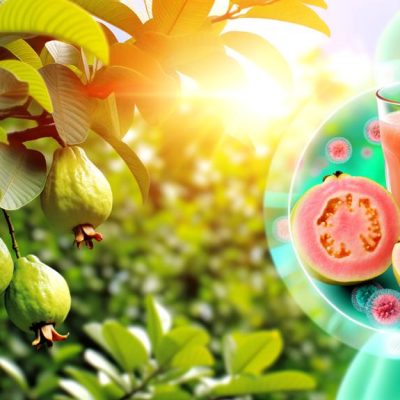If you’re experiencing allergy to Guava, it could be because your immune system is reacting to the proteins in the fruit, causing an allergy. Symptoms like itching, hives, swelling, and digestive issues are common indicators. Severe cases could lead to anaphylaxis, which is critical. Testing methods like skin prick tests and blood tests can confirm the allergy. Consulting an allergist for personalized management advice is vital. Understanding these aspects can help you navigate the complexities of guava allergies and their treatment effectively.
Guava Allergy Overview
Understanding the prevalence and symptoms of guava allergies is essential for individuals seeking to manage their allergic reactions effectively.
Guava allergies are primarily caused by the body’s immune system overreacting to proteins found in guava fruit. This overreaction triggers the release of histamines and other chemicals, leading to allergic symptoms.
Prevention strategies for guava allergies involve avoiding direct contact with guava fruit, juices, or products containing guava. Reading food labels carefully is important since guava can be found in various food items. Cross-reactivity with other fruits such as kiwi, papaya, and pineapple is also common among individuals with guava allergies.
It’s essential to consult with an allergist for proper diagnosis and guidance on managing guava allergies. Allergy testing can help identify specific triggers, enabling individuals to develop personalized prevention plans.
Common Symptoms
Common symptoms of guava allergy include itching, hives, swelling, and gastrointestinal disturbances. When exposed to guava proteins, your immune system may launch an abnormal response, leading to these manifestations. The itching is often intense and can present as an itchy rash on your skin, commonly known as urticaria. Hives, or welts, are raised, red or skin-colored bumps that appear due to increased permeability of small blood vessels. Swelling, also called angioedema, can affect the face, lips, tongue, or throat and may lead to respiratory symptoms if the airway is compromised. Gastrointestinal disturbances such as nausea, vomiting, or diarrhea can also occur as your body reacts to guava allergens.
| Common Symptoms of Guava Allergy | |
|---|---|
| Itching (pruritus) | Hives (urticaria) |
| Swelling (angioedema) | Gastrointestinal disturbances |
This table summarizes the common symptoms experienced by individuals with a guava allergy, ranging from skin manifestations to gastrointestinal issues.
Severe Reactions
When exposed to guava allergens, individuals may experience severe reactions that can range from anaphylaxis to systemic symptoms affecting multiple organ systems. Severe reactions to guava can be life-threatening and require prompt emergency response.
- Anaphylaxis: This is a severe, potentially fatal allergic reaction characterized by symptoms such as difficulty breathing, swelling of the throat, a sudden drop in blood pressure, and loss of consciousness. Anaphylaxis requires immediate administration of epinephrine and emergency medical attention.
- Systemic Symptoms: Severe reactions can manifest as symptoms affecting various organ systems, such as gastrointestinal symptoms like nausea, vomiting, or diarrhea, respiratory symptoms like wheezing or shortness of breath, and cardiovascular symptoms like chest pain or palpitations. These systemic symptoms can rapidly escalate and necessitate urgent intervention.
- Emergency Response: In cases of severe reactions, it’s important to seek immediate medical help. Emergency response may include the administration of epinephrine, intravenous fluids, oxygen therapy, and close monitoring in a healthcare setting to manage the allergic reaction effectively.
Diagnosis Methods
One important method for diagnosing guava allergy is through specific IgE blood tests that detect the presence of antibodies produced in response to guava allergens. These diagnostic tools are vital in identifying individuals who may have an allergic reaction to guava. Specific IgE blood tests measure the levels of immunoglobulin E antibodies that are produced by the immune system when exposed to guava proteins. Elevated levels of specific IgE antibodies indicate sensitization to guava allergens, suggesting an allergy.
In addition to specific IgE blood tests, an elimination diet can also be a valuable diagnostic tool for identifying guava allergy. This method involves removing guava and guava-containing products from your diet for a certain period while monitoring for any allergic symptoms. If symptoms improve during the elimination phase and reappear upon reintroduction of guava, it can indicate an allergy to guava. Combining specific IgE blood tests with an elimination diet can provide a thorough approach to diagnosing guava allergy.
Allergy Testing
To assess guava allergy, various allergy testing methods can be employed to identify specific allergens triggering adverse reactions in individuals. Two common methods used for diagnosing guava allergy include skin prick tests and blood tests.
- Skin Prick Test: This test involves placing a small amount of guava extract on the skin, usually the forearm or back, and then pricking the skin with a sterile needle to introduce the allergen. If a raised bump surrounded by redness, itching, or swelling appears at the site within 15-20 minutes, it indicates a positive allergic reaction to guava.
- Blood Test: Blood tests, such as specific IgE tests, measure the levels of immunoglobulin E antibodies in the blood that are produced in response to guava allergens. Elevated IgE levels specific to guava proteins suggest an allergic sensitivity to guava. This test is particularly useful when skin prick testing isn’t feasible due to skin conditions or medications that interfere with the results.
These tests are essential in confirming guava allergy and guiding appropriate management strategies.
Cross-Reactivity
Cross-reactivity between guava and other fruits is a common phenomenon in individuals with guava allergy, leading to potential allergic reactions triggered by similar proteins present in related fruits. This phenomenon occurs due to the presence of allergenic proteins in guava that can cross-react with proteins in other fruits.
For individuals with food sensitivities, especially to guava, it’s essential to be cautious when consuming fruits that belong to the same botanical family, such as mangoes, kiwis, and bananas, as they may trigger allergic reactions due to cross-reactivity.
Additionally, individuals with pollen allergies may experience cross-reactivity between certain fruits and pollen allergens. For example, if someone is allergic to birch pollen, they may also experience allergic symptoms when consuming guava, as well as apples, cherries, or almonds, due to the similarity between the proteins in these fruits and birch pollen.
Understanding cross-reactivity between guava and other fruits is critical in managing allergies and avoiding potential allergic reactions.
Managing Allergy Triggers
Understanding and effectively managing allergy triggers is essential for individuals with guava allergy to avoid potential allergic reactions triggered by specific proteins present in guava and related fruits.
To minimize the risk of allergic reactions, consider the following:
- Avoiding Triggers: Stay informed about foods that may cross-react with guava, such as kiwi, papaya, and mango. Read food labels carefully and inquire about ingredients when dining out to prevent accidental exposure.
- Lifestyle Modifications: Implement lifestyle changes to reduce the likelihood of coming into contact with guava allergens. For example, consider wearing gloves while handling guava fruits, using separate utensils and cutting boards, and informing friends, family, and coworkers about your allergy to prevent accidental exposure.
- Consultation: If you suspect you have a guava allergy, consult an allergist for proper testing and guidance on managing your allergy triggers effectively. They can provide personalized advice on avoiding triggers and lifestyle modifications tailored to your specific needs.
Treatment Options
Treatment of guava allergy typically involves allergen avoidance, symptom management, and potentially immunotherapy for severe cases. Allergen avoidance is the cornerstone of managing guava allergy. Reading food labels carefully, informing restaurant staff about your allergy, and being cautious about cross-contamination are essential. Symptom management includes the use of antihistamines, corticosteroids, and in severe cases, epinephrine for anaphylaxis. Immunotherapy, such as allergy shots, may be considered for individuals with severe allergies to build tolerance over time. Additionally, alternative remedies, dietary changes, herbal supplements, and home remedies are sometimes explored by individuals. However, it is important to consult healthcare professionals before trying these approaches. Below is a table summarizing common treatment options for guava allergy:
| Treatment | Description | Effectiveness | Considerations |
|---|---|---|---|
| Allergen Avoidance | Avoiding guava and products containing guava | High | Essential for managing guava allergy |
| Symptom Management | Antihistamines, corticosteroids, epinephrine | Moderate to high | Effective for controlling allergy symptoms |
| Immunotherapy | Allergy shots to build tolerance | Moderate to high | Considered for severe cases of guava allergy |
Lifestyle Adjustments
To better manage your guava allergy and improve your overall quality of life, incorporating lifestyle adjustments can play a significant role in minimizing potential allergen exposure and reducing symptom severity. Making specific changes in your diet can help prevent accidental ingestion of guava and alleviate allergic reactions.
- Diet Modifications: Avoiding guava and products containing guava is crucial. Read food labels carefully, as guava can be present in various forms such as juices, jams, and desserts.
- Alternative Fruits: Incorporate other fruits into your diet that don’t trigger your allergies. Opt for fruits like apples, pears, or berries as safe alternatives to guava.
- Consult a Dietitian: Seek guidance from a dietitian to guarantee your diet remains balanced and nutritious despite excluding guava. They can help you plan meals that meet your nutritional needs while avoiding allergic triggers.
Seeking Medical Help
When considering managing a guava allergy, seeking medical help is essential for accurate diagnosis and personalized treatment planning. Consulting specialists such as allergists or immunologists can help identify the specific allergen causing the reaction through skin prick tests or blood tests measuring IgE levels. These professionals can also provide guidance on allergy prevention strategies and prescribe medications like antihistamines or epinephrine auto-injectors for severe allergic reactions.
To further prevent allergic reactions, it’s important to understand label reading for hidden sources of guava in processed foods and cosmetics. Additionally, keeping a detailed diary of symptoms and suspected triggers can aid healthcare providers in pinpointing the allergen. Seeking medical advice promptly after experiencing an allergic reaction is important to prevent future, potentially more severe, incidents. Remember, managing a guava allergy effectively involves collaboration with healthcare professionals to ensure proper diagnosis, treatment, and prevention strategies are in place.
| Consulting Specialists | Allergy Prevention |
|---|---|
| Allergists or Immunologists can provide accurate diagnosis | Understand label reading for hidden guava sources |
| Skin prick tests or IgE blood tests for identifying allergens | Keep a detailed diary of symptoms and triggers |
| Prescription of medications for allergic reactions | Seek medical advice promptly after a reaction |
Frequently Asked Questions
Can Guava Allergies Develop Later in Life, or Are They Typically Present From Childhood?
Developing allergies in adulthood is possible. Genetic predisposition plays a role, but triggers vary. Testing is essential for diagnosis. Allergies can emerge later in life due to environmental factors or changes in immune response.
Are There Any Alternative Fruits That Can Be Safely Consumed by Individuals With a Guava Allergy?
You can explore various fruit alternatives that are safe for consumption if you have a guava allergy. Opt for fruits like apples, pears, or berries. To prevent allergic reactions, always read food labels carefully and consult with a healthcare provider for personalized advice.
How Long Does It Typically Take for Symptoms of a Guava Allergy to Appear After Consumption?
Symptoms of a guava allergy can vary in their onset time. Some individuals may experience immediate symptoms after consumption, while others might have a delayed reaction that shows up gradually over time.
Are There Any Specific Precautions Individuals With a Guava Allergy Should Take While Dining Out or Eating at Restaurants?
When dining out with a food allergy, always communicate clearly with restaurant staff about your specific needs. Ask about potential cross-contamination risks and menu substitutions. Stay vigilant and practice good dining etiquette to guarantee your safety.
Are There Any Home Remedies or Natural Treatments That Can Help Alleviate Symptoms of a Guava Allergy?
To alleviate symptoms of a guava allergy, consider herbal remedies, dietary changes, lifestyle modifications, and acupuncture. These approaches may help manage allergic reactions and improve overall well-being, providing natural relief from discomfort.
Conclusion
To sum up, a guava allergy can manifest with a variety of symptoms, from mild to severe reactions. Diagnosis through allergy testing is vital for proper management and treatment.
Avoiding triggers and seeking medical help when experiencing symptoms are essential steps in managing this allergy. By understanding the potential risks and taking necessary precautions, individuals can effectively navigate living with a guava allergy.














